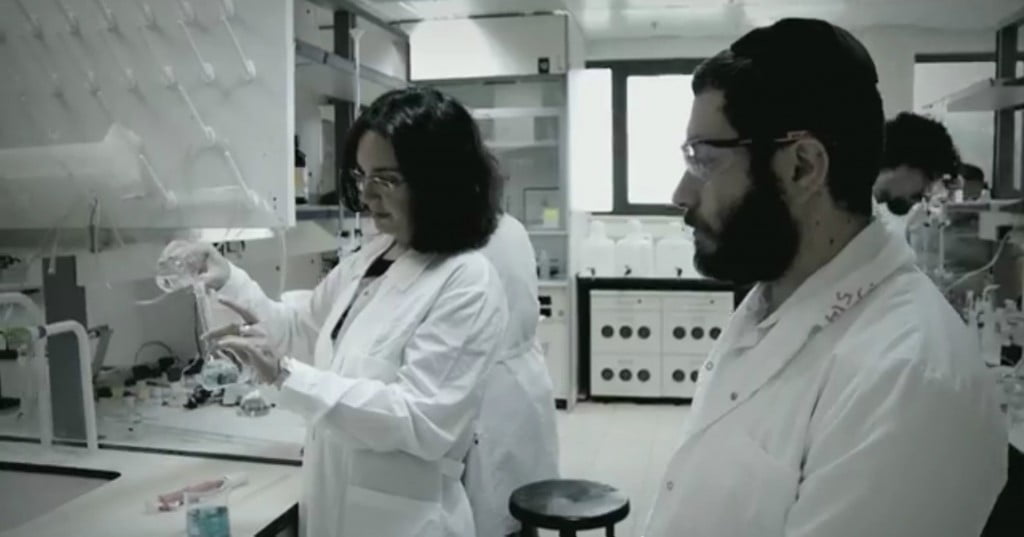Haredi Israelis are often criticized for not sufficiently taking part in Israeli public life, with only a small percentage serving in the army or even joining the workforce. And because their school years are often devoted to the study of Torah, Haredim come into adulthood with limited math, science and foreign language skills. This means that only six percent of Haredi 12th graders actually qualify to go to university, according to the Institute of Israel Studies.
The Technion – Israel’s Institute of Technology – is now trying to attract more ultra-orthodox to its academic programs, with a pre-university program that enables them to catch up on some of the core knowledge they may have missed.
Although Haredi schools are required to teach 55-75 percent of “core studies,” many do not. The Technion program takes 18 months, during which young Haredim who never previously studied English or science and have only learned rudimentary mathematics are brought up to the necessary level. Most are then accepted to study in the standard programs.
According to the Technion, graduates of its program are currently working as engineers in high tech companies and some are pursuing advanced degrees.
Related articles
- Unique MIT-Backed Program MEET Uses Technology To Bridge Gaps Between Israeli And Palestinian Youths
- Israel’s High-Tech Challenge: Including Arabs In The Workforce
Going against the grain
This program is also aimed at curbing the high poverty levels among the ultra-orthodox population, which is caused in part by their lack of participation in the workforce. The issue is now high on the agenda of most education policy makers, as the Haredi community is growing faster than any other section of society. According to the Israel Democracy Institute, their annual growth rate is 5 percent, versus 1.8 percent for secular Israelis, meaning the ultra-orthodox will make up 20 percent of the country’s population by 2030.
According to Rabbi Dov Lipman, a member of the Israeli Knesset with the Yesh Atid party and Chair of the Knesset Lobby for Job Integration in the Haredi community, “there is now a very high percentage, higher than ever before of first graders who are Haredim. Twelve years down the road, we are talking about a high percentage of first graders who are not receiving a basic general education, are not being trained to enter the workforce.”
[youtuber youtube=’http://www.youtube.com/watch?v=EPLmp_u-Qok’]
Sign up for our free weekly newsletter
SubscribeHe adds: Thinking ahead, the best investment that we can make is in a program like that which the Technion offers,” explains Rabbi Lipman.
Lipman also understands that for many Haredim, not going to university is not a personal choice: “It is very important to understand that the Haredi who do go into the academia and go into the workforce are very brave, because the pressures in their community are against them doing so and therefore those who are coming are coming from a position of weakness, both economically and socially.”
Revolutionizing a traditional community
Ensuring that the Haredim don’t see this an encroachment on their way of life is key to the Technion program, says Lipman. “This is something that I believe can revolutionize Israel, that young men [can] be fervently orthodox, be Haredi. No one is asking anyone to be less religious, become Talmudic scholars of the highest caliber.”
He believes the Technion program is striking the right balance: “They are provided with an opportunity to remain Haredim, but also to receive an education at the highest of levels, which will then bring them into the workforce at the highest of levels. And in doing this, we will be saving this community from the poverty and broader Israel from an economic catastrophe. I can think of no better investment for the future of Israel.”
Rabbi Dov Lipman made Aliyah to Israel from the United States in 2004. Upon his arrival in Israel, he was struck by the differences in the American and Israeli Haredi communities. While he was able to receive an academic education in parallel to his studies at a yeshiva in the United States, he found that no such opportunities existed in Israel.
The Technion program is backed by Israeli businessman and philanthropist Eitan Wertheimer, who supports the students financially and academically.
Photo: Technion on YouTube
Related posts

Rehabilitation Nation: Israeli Innovation On Road To Healing

Israeli High-Tech Sector 'Still Good' Despite Year Of War





Facebook comments